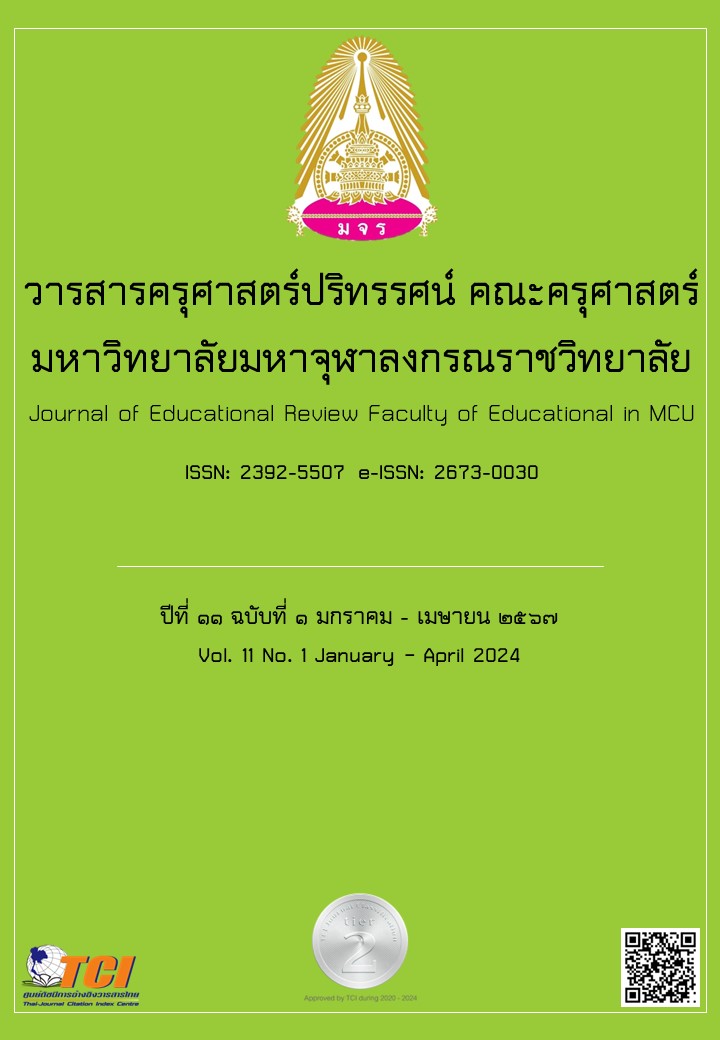DEVELOPMENT OF PARTICIPATORY LEARNING RESOURCES MODEL IN EDUCATIONAL INSTITUTIONS TO PROMOTE ACTIVE LEARNING AND ENHANCE LIFE SKILLS OF STUDENTS AT THA KHLONG 1 MUNICIPAL SCHOOL
Main Article Content
Abstract
This research article was the development of a learning resource model in participatory educational institutions to promote active learning and increase students' life skills at Tha Khlong 1 Municipality School. The objectives of this research were 1) to analyze the current conditions, problems, and needs in developing a model of learning resources in a participatory educational institution, 2) to develop a learning resource model in participatory educational institution, 3) to carry out an experiment with the learning resource model in participatory educational institutions and 4) to evaluate the results of the learning resource model in participatory educational institutions by using Research and Development: R&D. The research had procedure due to conducted into 4 steps as follows: Step 1: Research (Research: R1), to analyze the current condition, needs, problems and to develop a model of learning resources in educational institutions. Step 2: Development (Development: D1), to develop a model of learning resources in educational institutions. Step 3: Research (Research: R2), to carry out an experiment model of learning resources as participatory educational institutions and step 4: Development (Development: D2), evaluate (Evaluation: E) of development and improvement of learning resource formats in educational institutions with participation to promote active learning and increase students' life skills. The findings were as follows: 1) the results of analysis of current conditions, problems, and needs in developing learning resource models in participatory educational institutions found out that studying problems including needs and requirements. The participants were informed about the development of the model under the actions; principles, objectives, mechanisms, processes, evaluation, and the condition of success as participated in planning and determining the work strategy for developing learning resources, including study observing a model school for organizing activities to develop learning resources in educational institutions, consultation to brainstorm and discuss current conditions, problems, needs, and development guidelines, seeking outside cooperation to give information on the operations to the co-researchers to have the same understanding, together with obtaining development guidelines through practicing activities to develop a learning resource model. Furthermore methods for evaluating results, monitoring, evaluating, and evaluating compliance, development activities were carried out periodically and summarized for reporting/publication in order to extend the results by summarizing the results, developing learning resources and reporting results to the original affiliation. 2) The results of developing learning resource models in participatory educational institutions had 6 components: (1) A survey of community participation (Community: C), (2) Problem conditions and needs (Assessing Need: A), (3) Planning (Planning: P), (4) Operation (Doing: D), (5) Evaluation (Evaluation: E), (6) Reporting/Publishing results (Reporting: R) (CAPDER Model) which consisted of principles, objectives, and operating mechanisms to proceed evaluation and success conditions. 3) The results of the experiment using the model for developing participatory learning resources in educational institutions. According to observation and interviews, found out that the participants and all associates had likewise opinions and cooperated very well. Furthermore, they worked on their pride and executive improve his leadership skills. Moreover, teachers had a variety of approaches and methods for organizing and learning that emphasized learner-centered learning. Therefore, students improved their learning and life skills. 4) The evaluation of the model for developing learning resources in participatory educational institutions to promote organizing active learning and increasing students' life skills found out that the overall to promote active learning and students’ life skills were both at the highest level. Moreover, the overall of the satisfaction of development model participatory learning resources in educational institutions to promote management, learning proactively and increase students' life skills was also at the highest level.
Article Details

This work is licensed under a Creative Commons Attribution-NonCommercial-NoDerivatives 4.0 International License.
ทัศนะและความคิดเห็นที่ปรากฏในบทความในวารสารฉบับนี้ถือเป็นความรับผิดชอบของผู้เขียนบทความนั้นเพียงผู้เดียว และไม่ถือเป็นทัศนะและความรับผิดชอบของกองบรรณาธิการ
กองบรรณาธิการขอสงวนสิทธิ์ในการคัดเลือกบทความลงตีพิมพ์และจะแจ้งให้เจ้าของบทความทราบหลังจากผู้ประเมินบทความตรวจอ่านบทความแล้ว
ต้นฉบับที่ได้รับการตีพิมพ์ในวารสารครุศาสตร์ปริทรรศน์ คณะครุศาสตร์ มหาวิทยาลัยมหาจุฬาลงกรณราชวิทยาลัย ถือเป็นกรรมสิทธิ์ของคณะครุศาสตร์ มหาวิทยาลัยมหาจุฬาลงกรณราชวิทยาลัย ห้ามนำข้อความทั้งหมดหรือบางส่วนไปพิมพ์ซ้ำ เว้นเสียแต่ว่าจะได้รับอนุญาตจากมหาวิทยาลัยฯ เป็นลายลักษณ์อักษร
References
กระทรวงศึกษาธิการ. (2553). แนวทางการพัฒนา การวัด และประเมินคุณลักษณะอันพึงประสงค์ตามหลักสูตรแกนกลางการศึกษาขั้นพื้นฐาน พุทธศักราช 2551. กรุงเทพมหานคร: สำนักวิชาการและมาตรฐานการศึกษา สำนักงานคณะกรรมการการศึกษา.
จักรพงศ์ สุวรรณรัศมี (2556). การจัดการความรู้ในสถานศึกษาเพื่อเป็นองค์กรแห่งการเรียนรู้. วารสารวิชาการ. 16. 78.
ฉลาด จันทรสมบัติ. (2558). การพัฒนารูปแบบการจัดการความรู้องค์กรชุมชน. ดุษฎีนิพนธ์การศึกษาดุษฎีบัณฑิต. มหาวิทยาลัยมหาสารคาม.
ชนาวุธ ประทุมชาติ. (2553). การพัฒนารูปแบบการจัดการความรู้ของศูนย์การเรียนรู้ชุมชนขุมคํา อำเภอศรีเชียงใหม่ จังหวัดหนองคาย. ดุษฎีนิพนธ์การศึกษาดุษฎีบัณฑิต. มหาวิทยาลัยมหาสารคาม.
ชนิดา คือปัญญา. (2555). รูปแบบการมีส่วนร่วมระหว่างโรงเรียนกับชุมชนในการพัฒนาศูนย์การเรียนรู้เศรษฐกิจแบบพอเพียง กรณีศึกษาตำบลนาข่า อำเภอวาปี จังหวัด มหาสารคาม. วิทยานิพนธ์ครุศาสตรมหาบัณฑิต. มหาวิทยาลัยราชภัฏมหาสารคาม.
ญาณิศา ดวงสีทอง. (2561). การพัฒนาแหล่งเรียนรู้เพื่อสนับสนุนการจัดการเรียนรู้ในศตวรรษที่ 21 โรงเรียนหนองใสพรเจริญวิทยา สังกัดสำนักงานเขตพื้นที่การศึกษาประถมศึกษาสกลนคร เขต 2. วิทยานิพนธ์ครุศาสตรมหาบัณฑิต. มหาวิทยาลัยราชภัฏสกลนคร.
เด่นวิช ชูคันหอม. (2558). รูปแบบการพัฒนาแหล่งเรียนรู้แบบมีส่วนร่วมของชุมชนของสถานศึกษาสังกัดสำนักงานเขตพื้นที่การศึกษาประถมศึกษาขอนแก่น เขต 5. วารสารศึกษาศาสตร์ มหาวิทยาลัยมหาสารคาม. 9 (พิเศษ). 153-168.
ธัญลักษณ์ ศรีสร้อย. (2555). การส่งเสริมการใช้แหล่งเรียนรู้ในโรงเรียนบ้านคําแหว สังกัดสำนักงานเขตพื้นที่การศึกษาประถมศึกษาสกลนคร เขต 2. วิทยานิพนธ์ครุศาสตรมหาบัณฑิต. มหาวิทยาลัยราชภัฏสกลนคร.
ธีระ รุญเจริญ. (2550). การวิจัยในชั้นเรียน. พิมพ์ครั้งที่ 3. กรุงเทพมหานคร: วัฒนาพาณิช.
บรรเจิด มีกุล. (2555). การนําเสนอรูปแบบการนําแหล่งเรียนรู้ในชุมชนมาใช้ในการจัดการศึกษา ในโรงเรียนสังกัดเทศบาลของจังหวัดพระนครศรีอยุธยา. วิทยานิพนธ์ครุศาสตรมหาบัณฑิต. มหาวิทยาลัยราชภัฏพระนครศรีอยุธยา.
ปริญญา จันทะคาม. (2561). แนวทางการพัฒนาแหล่งเรียนรู้โดยการมีส่วนร่วมของชุมชน สำหรับสถานศึกษาสังกัดสํานักงานเขตพื้นที่การศึกษาประถมศึกษามหาสารคาม เขต 1. วิทยานิพนธ์ครุศาสตรมหาบัณฑิต. มหาวิทยาลัยมหาสารคาม.
พยุง ใบแย้ม. (2558). การพัฒนารูปแบบการใช้แหล่งเรียนรู้ที่เหมาะสมสำหรับสถานศึกษาในระดับประถมศึกษา. วารสารสารสนเทศ. 14 (1). 23-34.
พรรณี เสี่ยงบุญ. (2553). การพัฒนาแหล่งเรียนรู้ในสถานศึกษาเพื่อจัดการเรียนรู้ที่เน้นผู้เรียนเป็นสำคัญ โรงเรียนบ้านหนองบัวคู อำเภอนาดูน สำนักงานเขตพื้นที่การศึกษามหาสารคาม เขต 2. วารสารมหาวิทยาลัยราชภัฏมหาสารคาม. 6. 109-120.
มหาวิทยาลัยเกษตรศาสตร์. (2560). โครงการอบรมเชิงปฏิบัติการการจัดการเรียนรู้แบบ Phenomenon-based Teaching and learning. กรุงเทพมหานคร: ศึกษาศาสตร์ มหาวิทยาลัยเกษตรศาสตร์.
รุ่งชัชดาพร เวหะชาติ. (2553). การบริหารงานวิชาการสถานศึกษาขั้นพื้นฐาน. พิมพ์ครั้งที่ 4. สงขลา: นาศิลป์โฆษณา
วัตร ปะโคทัง. (2550). รูปแบบการมีส่วนร่วมของชุมชนในการจัดการศึกษาขั้นพื้นฐานของโรงเรียนดีเด่น โรงเรียนกันทรารมณ์ จังหวัดศรีสะเกษ. ดุษฎีนิพนธ์การศึกษาดุษฎีบัณฑิต. มหาวิทยาลัยบูรพา.
วิสันต์ พยุงวงษ์. (2560). แนวทางการพัฒนาและส่งเสริมให้มีแหล่งเรียนรู้แบบมีส่วนร่วมของชุมชน กรณีศึกษา โรงเรียนสังกัดสำนักงานเขตพื้นที่การศึกษามัธยมศึกษา เขต 24. วิทยานิพนธ์ครุศาสตรมหาบัณฑิต. มหาวิทยาลัยมหาสารคาม.
วุฒิไกร คําแฝง. (2557). รูปแบบการพัฒนาแหล่งเรียนรู้ด้วยการมีส่วนร่วมของคณะกรรมการสถานศึกษาขั้นพื้นฐาน กรณีศึกษาโรงเรียนกู่กาสิงห์ประชาสรรค์ อำเภอเกษตรวิสัย จังหวัดร้อยเอ็ด.วิทยานิพนธ์การศึกษามหาบัณฑิต. มหาวิทยาลัยมหาสารคาม.
สำนักงานคณะกรรมการการศึกษาแห่งชาติ. (2548). พระราชบัญญัติการศึกษาแห่งชาติ พ.ศ. 2542. กรุงเทพมหานคร: สำนักงานคณะกรรมการการศึกษาขั้นพื้นฐาน.
สำนักงานคณะกรรมการการศึกษาแห่งชาติ. (2551). แนวทางการพัฒนาทักษะชีวิตบูรณา การการเรียนการสอน 8 กลุ่มสาระการเรียนรู้หลักสูตรแกนกลางการศึกษาขั้นพื้นฐาน พุทธศักราช 2551. กรุงเทพมหานคร: โรงพิมพ์ชุมนุมสหกรณ์การเกษตรแห่งประเทศไทย.
สำนักงานรับรองมาตฐานและการประเมินคุณภาพการศึกษา. (2549). มาตรฐานการศึกษาตัวบ่งชี้และเกณฑ์การพิจารณาเพื่อการประเมินคุณภาพภายนอกระดับการศึกษาขั้นพื้นฐาน (พ.ศ. 2549 - 2553). กรุงเทพมหานคร: สำนักงานรับรองมาตฐานและการประเมินคุณภาพการศึกษา.
สุธรรม ธรรมทัศนานนท์. (2553). หลักการทฤษฎีและแนวปฏิบัติทางการบริหารการศึกษา. มหาสารคาม: มหาวิทยาลัยมหาสารคาม.


